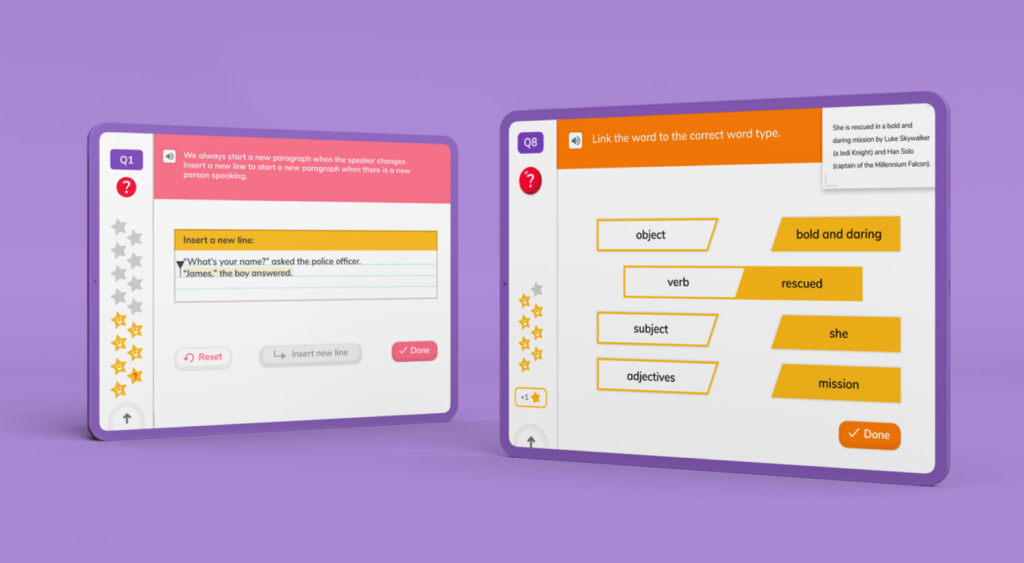

Learn what’s taught in the Year 2 English Curriculum across the subjects of reading, comprehension, writing, composition, and grammar.

Author
Mhairi Sim
Published
August 2024


Learn what’s taught in the Year 2 English Curriculum across the subjects of reading, comprehension, writing, composition, and grammar.

Author
Mhairi Sim
Published
August 2024


Learn what’s taught in the Year 2 English Curriculum across the subjects of reading, comprehension, writing, composition, and grammar.

Author
Mhairi Sim
Published
August 2024


Key takeaways
Table of contents
Year 2 marks the final year of the Key Stage 1 curriculum! As they follow the English Year 2 national curriculum our kiddos will continue to build their skills across reading, writing, and spoken language.
We’ve created this handy guide to the Year 2 English curriculum to answer any questions you might have on what’s covered and how to help your little ones with their learning! So, without further ado, let’s dive in to learn more about the Year 2 English curriculum!
As outlined in the national curriculum Year 2 English curriculum, students will spend a lot of time solidifying the skills they learned in Year 1 English, and also learn some new ones. They’ll delve deeper into the world of reading comprehension and start to build a handy toolkit of reading skills.
In writing, Year 2 kiddos are encouraged to plan, draft, and review their written work, as well as use a wider range of punctuation. It’s also expected that their handwriting is clear by the end of the year.
We’ve broken down each element of the curriculum to show exactly what our little ones should know and achieve by the end of Year 2.
As in Year 1, the Year 2 national curriculum English students will cover two important aspects of reading – word reading and comprehension.
In Year 2, learners will continue to develop and apply their phonic knowledge to decode and read familiar and unfamiliar words. They should also be able to recognise alternative grapheme sounds (i.e. letters or groups of letters that sound different depending on the word they are in).
On their journey to become fluent readers, they’ll also:
By the end of Year 2, our little ones should be able to read most words that they’re frequently faced with confidently, without needing to blend or sound out.
Year 2 students continue to gain a deeper understanding of reading, beyond the words on the page.
To learn and grow their comprehension skills, Year 2 English students will:
As they grow their comprehension skills, vocabulary and critical thinking skills should grow.
Teachers help develop these critical thinking skills by encouraging discussions and having their pupils:
Unlock unlimited English questions
Put your skills to the test with fun exercises + learning games that are proven to boost ability!
DoodleEnglish is an app that’s filled with thousands of fun, interactive exercises covering grammar, punctuation, spelling and more!
Designed by teachers, it creates each child a unique work programme tailored to their needs, boosting their confidence and skills in English. Try it for free today!

Following the English national curriculum, Year 2 students will cover three aspects of writing throughout the year; transcription, composition, and vocabulary, grammar, and punctuation. Within each of these areas, they’ll build on what they’ve covered previously while adding in some new skills too!
Closely linked to word reading, Year 2 students will continue to use phonemes and graphemes to break down words and spell them correctly. In addition, they’ll learn new ways of spelling phonemes and learn some common homophones too!
As they progress with their spelling, kiddos will learn to:
By the end of Year 2, handwriting should be much more developed too! Pupils should be able to form lower-case letters properly and be able to start joining up some letters.
In Year 2, teachers are focused on developing a positive attitude towards writing. To do this, students should be given the opportunity to write for lots of different purposes such as story writing, poems, instructions, and more.
Before writing, students are encouraged to think about what they’re going to put down on paper. They’ll learn how to plan their writing through brainstorming ideas.
Finally, students will learn how to check and edit their work – a vital step! They’ll learn to proofread their work for clarity and proper punctuation before turning it in for marking!
Finally, throughout the year, Year 2 students will be working on their vocabulary, grammar, and punctuation as specified in the English Appendix 2 document.
Some aspects that English national curriculum Year 2 students should be comfortable with by the end of the year include:
Last but not least, they’ll also be expected to use various forms of punctuation correctly. This includes:
A key element of the English curriculum is spoken language. This element concerns developing our learners’ abilities to speak to and listen to others.
The curriculum for spoken language spans Year 1 – Year 6 with educators being advised to teach the content to a suitable level for their learners.
Learners should be encouraged to listen and respond, build their vocabulary, stay on topic during discussions, speak in a tone and volume suitable for their audience and more.
You’ll be relieved to hear that there are no compulsory English assessments in Year 2. Up until recently, students would sit Standard Assessment Tests, or SATs, at the end of Year 2.
While these assessments are no longer mandatory, some schools may still choose to have their students sit these exams as an assessment tool. The scores can help schools identify students who need additional support as they move into Year 3 and begin the KS2 curriculum.
For those interested, check out of KS1 Reading SATs guide to learn more.
There are a bunch of ways to help your child with the English Year 2 national curriculum! At this stage, the key elements that our little ones will need to get nailed down are their ability to read more unfamiliar texts and develop a positive attitude to writing.
One of the best things your learner can do to boost their reading skills is….you guessed it… read! The more opportunities they have to practice word recognition and decoding skills, the more instinctive it becomes.
Here are some ideas I recommend trying:
There’s a lot to cover in Year 2 as our learners finish up the Key Stage 1 curriculum! It’s important that by the end of this year, they’re working a little more independently in reading and writing.
Take some time to try out some of our suggestions above with your kiddos to boost their English skills. We’re sure that some extra practice is a great way to help them succeed as they navigate the Year 2 national curriculum English programme!
Book a chat with our team
If you’d like to use Doodle’s browser version, please visit this page on a desktop.
To log in to Doodle on this device, you can do so through our apps. You can find out how to download them here: